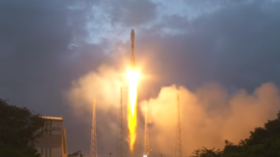WATCH Russian Soyuz rocket launch 1st OneWeb satellites to revolutionize internet

A Soyuz rocket has successfully launched six OneWeb satellites in the first of 21 planned launches to place 650 units in orbit with the ultimate goal of providing broadband internet “everywhere” to “everyone.”
The first group of satellites was launched from the space center in French Guiana at 21.37 GMT on Wednesday. The Russian rocket shot the payload into low Earth orbit, with all six satellites separating on time, OneWeb founder and chairman Greg Wyler tweeted.
All 6 confirmed !!! 👍👍👍👍👍👍👍
— Greg Wyler (@greg_wyler) February 27, 2019
OneWeb is a satellite startup founded by the American tech entrepreneur under the name WorldVu in 2012, aiming to provide affordable high-speed internet worldwide, including parts of the world with poor or no internet access.
The maiden OneWeb launch apparently went without a hitch, with Wyler tweeting: "Perfect drop off Soyuz!!!"
Perfect drop off Soyuz!!!!🚀🚀🚀
— Greg Wyler (@greg_wyler) February 27, 2019
Dmitry Rogozin, the head of the Russian Space Agency (Roscosmos), congratulated Wyler on the "successful start of cooperation" between OneWeb Satellites, which is a joint venture between OneWeb and Airbus, and the Russian space agency.
The ambitious mission was completed by European launch provider Arianespace, which used a Soyuz launcher to put the satellites into space.
READ MORE: Russian space chief says security people too twitchy about OneWeb global internet project
The road to the launch was not without bumps. Last month, it was reported that specialists from Roscosmos subsidiary NPO Lavochkin discovered a crack in the Fregat upper stage, which serves as the fourth stage of the Soyuz rocket. It was feared that the flaw could push back the launch, which was initially scheduled for February 19, to March or even next year.
Over 648 satellites will be placed into low-Earth orbit by Soyuz rockets in a series of monthly launchers agreed between Roscosmos, Arianespace, and OneWeb in 2015. Up to 36 satellites will be lifted in one payload.
OneWeb hopes to start putting its massive constellation into service as early as 2020 and be able to provide global coverage the following year.
Think your friends would be interested? Share this story!














